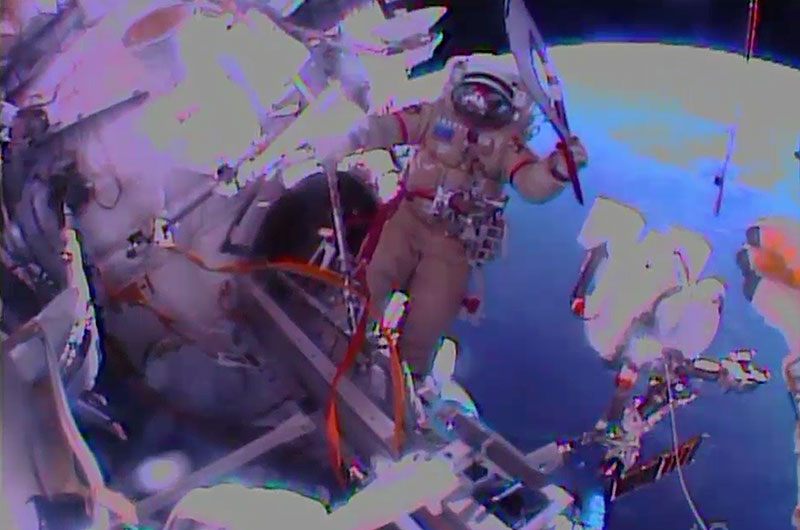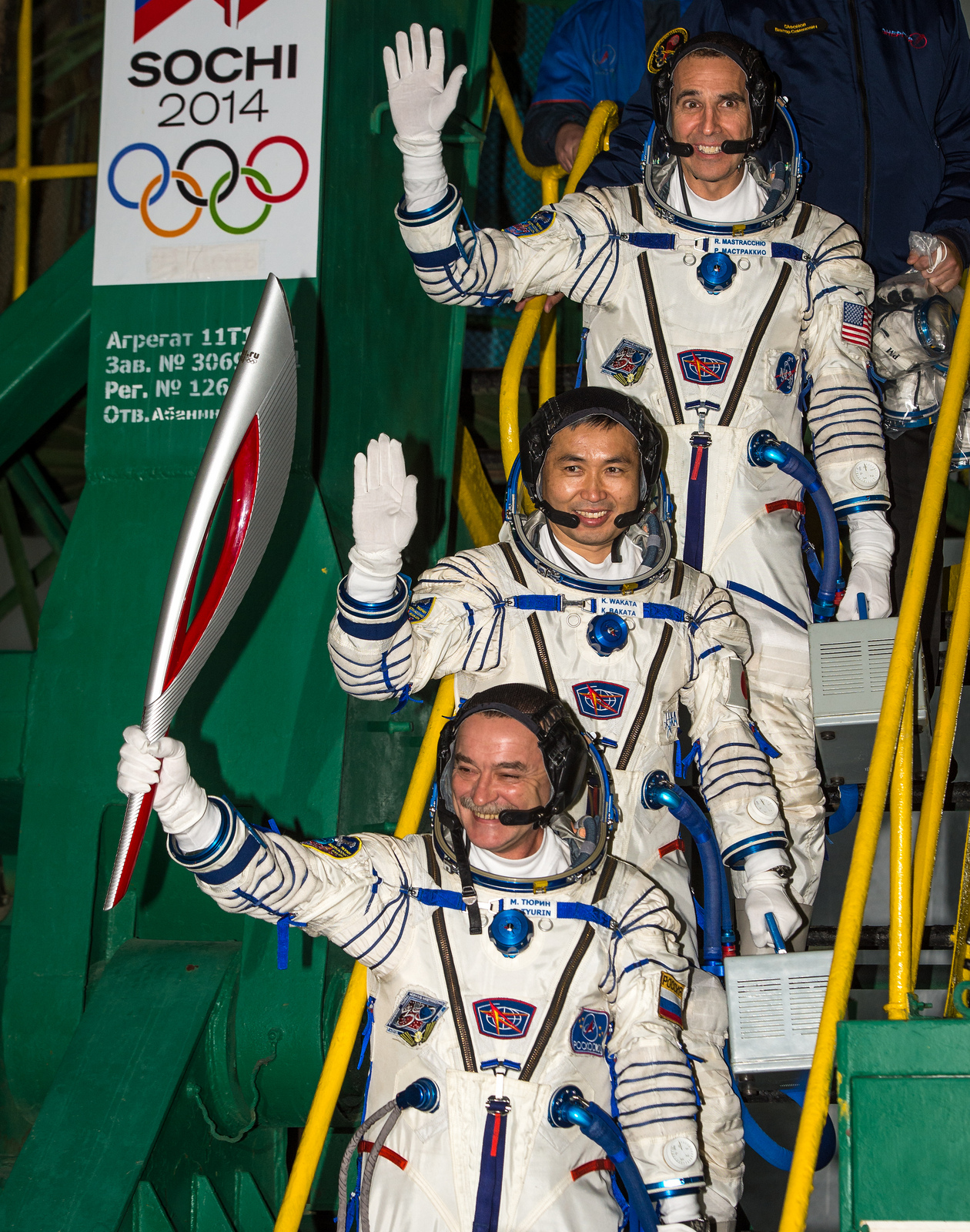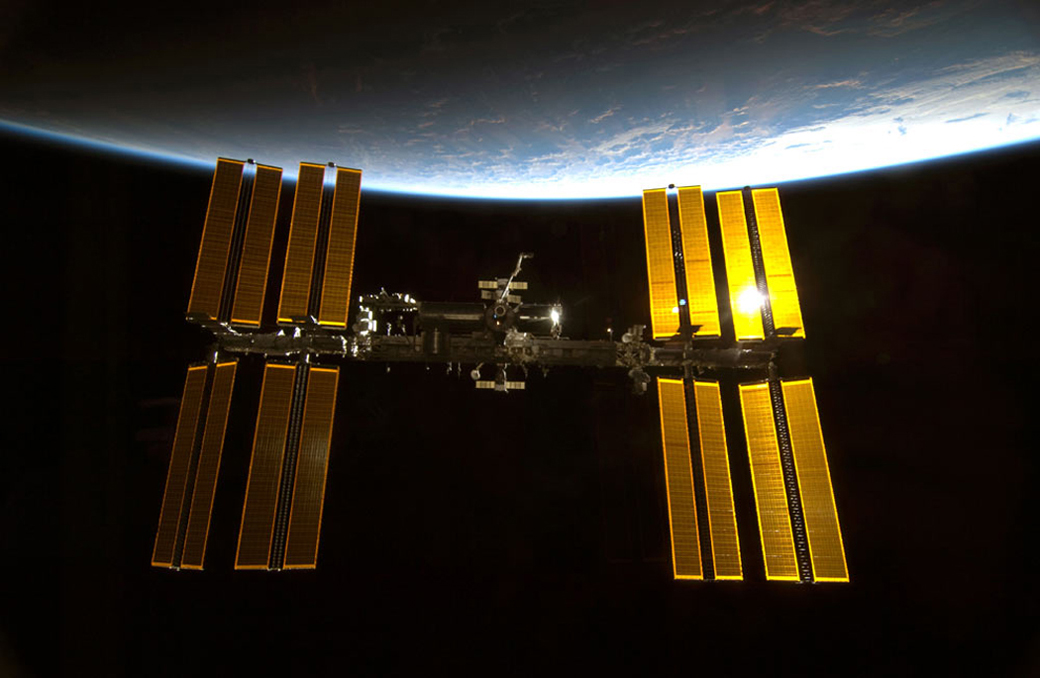Spacewalking Cosmonauts 'Run' Historic Olympic Torch Relay in Space

(Editor's Note: The Olympic torch spacewalk has ended. See a video of the historic event here: 'Olympic Torch' Taken Out On Spacewalk )
Olympic history unfolded outside the International Space Station Saturday morning (Nov. 9) as two Russian cosmonauts carried an unlit Olympic torch on a symbolic spacewalk relay for the 2014 Games.
Emerging from the orbital outpost at 9:34 a.m. EST (1434 GMT) through a hatch on the Pirs docking module, Oleg Kotov and Sergey Ryazanskiy with Russia's federal space agency Roscosmos began the planned six-hour excursion by posing with the torch for an unprecedented photo opp.

"We will take a picture of it with the space station in the background, with the Earth in the background, and we will try to make sure that we see Russia, and maybe Sochi where the Olympic Games will take place," Kotov said of the torch relay in a NASA interview. "I think these will be very interesting videos and pictures that will be used to promote the Olympic Games." [See more photos of the Olympic torch spacewalk]
The aluminum red and silver torch, which for the exception of a tether is identical to the 14,000 torches being used in the traditional terrestrial relay — now a month underway in Russia, arrived at the space station on Thursday (Nov. 7) with three new crew members for the orbital laboratory. As the spacewalking cosmonauts passed the torch above the Earth, the Olympic flame was being run through Yakutsk, Russia, one of the oldest cities in Siberia.
"We will be part of this whole chain, part of this wonderful relay of the Olympic torch," Ryazanskiy said.
"The most interesting part here is that our relatives, our families, will be participating in this relay as well. My wife and Oleg Kotov's daughter on Earth will be participating in the relay," the 38-year-old Expedition 37/38 flight engineer said.
Get the Space.com Newsletter
Breaking space news, the latest updates on rocket launches, skywatching events and more!
The 2014 Sochi Olympic torch is the third to reach space. Previous replica and unlit torches were launched in 1996 and 2000 on NASA space shuttles, but they stayed inside for the full time they were on orbit.
Taking the torch
Ryazanskiy was first to exit the space station, putting him in position to photograph Kotov as he came floating out of the hatchway with the torch.
From there, the spacewalkers were to take turns handing off the torch as numerous cameras captured the scene. In addition to the exterior mounted cameras on the International Space Station, crew members inside the outpost's multi-windowed Cupola were also set to photograph and film the two cosmonauts.
Kotov and Ryazanskiy will also use commercial GoPro cameras to capture their own view of the torch.
"We are going to move along the outside of the Russian segment and will be symbolically handing over the torchfrom one crew member to the other," Kotov told reporters on Friday. "We will repeat that a couple or three times to make sure we will have a pretty picture, to make sure the whole world and our country will see the torch in a nice way with the background of the Earth and black space."
After about an hour, with the relay recorded for posterity, the spacewalkers were to stow the torch in the airlock and continue on with their maintenance work.
"[The torch relay] is not the only task that we are going to have, this will be just one stage of the whole session of activities outside the station this time," Kotov explained.
Kotov and Ryazanskiy will prepare a pointing platform on the hull of the space station's Zvezda service module for installation of a high resolution camera system, relocate a foot restraint for use on future spacewalks and deactivate an experiment package.

What goes up
With its historic outing completed, the torch will be brought back inside the space station and packed aboard Russia's Soyuz TMA-09M spacecraft for return to Earth on Sunday with the outgoing Expedition 37 crewmembers. Roscomos cosmonaut Fyodor Yurchikhin, NASA's Karen Nyberg and Luca Parmitano of the European Space Agency (ESA) are departing for home after five-and-a-half months in space.
"Oleg and Sergey will give the torch to us. This will be the third space vehicle that the torch will be traveling on and we will hand it over later to the Olympic committee," Yurchikhin said.
The torch will then make its way to Sochi, Russia, where on Feb. 7, 2014 it will be used in the opening ceremonies beginning the 22nd Winter Games.
"Today we are making Olympic history by taking the torch on a spacewalk for the first time," Dmitry Chernyshenko, president of the Sochi 2014 Organizing Committee, said. "This feat underlines incredible human capabilities and will symbolize the aspirations of all athletes from around the world to reach new heights in sports."
Follow collectSPACE.com on Facebook and on Twitter at @collectSPACE. Copyright 2013 collectSPACE.com. All rights reserved.
Join our Space Forums to keep talking space on the latest missions, night sky and more! And if you have a news tip, correction or comment, let us know at: community@space.com.

Robert Pearlman is a space historian, journalist and the founder and editor of collectSPACE.com, a daily news publication and community devoted to space history with a particular focus on how and where space exploration intersects with pop culture. Pearlman is also a contributing writer for Space.com and co-author of "Space Stations: The Art, Science, and Reality of Working in Space” published by Smithsonian Books in 2018.In 2009, he was inducted into the U.S. Space Camp Hall of Fame in Huntsville, Alabama. In 2021, he was honored by the American Astronautical Society with the Ordway Award for Sustained Excellence in Spaceflight History. In 2023, the National Space Club Florida Committee recognized Pearlman with the Kolcum News and Communications Award for excellence in telling the space story along the Space Coast and throughout the world.










